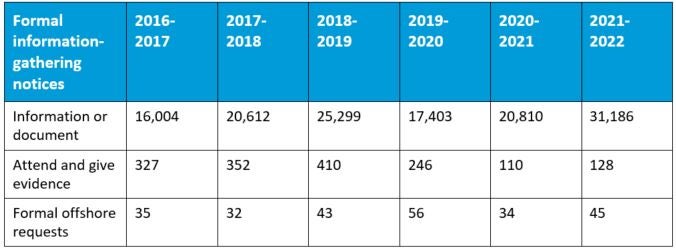12 January 2023
4 min read

The recent decision in Deputy Commissioner of Taxation v Widdup [2022] FCA 1403 (Widdup) is a timely reminder for taxpayers to prepare early and seek legal advice when responding to formal ATO information requests.
Section 353-10 of Schedule 1 to the Taxation Administration Act 1953 (Cth) provides the Commissioner of Taxation (Commissioner) with the power to furnish a notice requiring that the recipient give any information to the Commissioner; attend and give evidence before the Commissioner; and/or produce any documents to the Commissioner under the taxpayer’s custody or control.
It is a tool used frequently by the Commissioner, with the following statistics showing a trend of increasing use of formal notices:1

In Widdup, the validity of notices issued under section 353-10 (Notices) was challenged. The Federal Court held that there was no prima facie case that the Notices were invalid noting that notices will not be found to be invalid unless it can be clearly evidenced that the Commissioner has acted for an improper purpose or in bad faith.
Taxpayers need to prepare early to respond to information requests and seek independent legal representation to manage the ATO relationship.
In determining how to manage a response to a formal notice a taxpayer needs to take into account the following factors:
Given this, taxpayers should prepare early by documenting tax positions taken contemporaneously or seeking assistance to prepare appropriate defence files when tax risk are identified after the event.
Whilst extensions of time to respond to notices can and are often negotiated with the ATO, establishing a proper basis for any such request and demonstrating that you are taking proactive steps to assist ATO case officers, is essential. Seeking advice early and engaging appropriate legal representation can be key to making the process of responding to notices more efficient, whilst maximising and preserving your working relationship with the ATO.
Prepare early and seek independent advice before attending ATO interviews
Widdup’s case reminds us that whilst it is generally permissible for taxpayers to attend formal ATO interviews with legal representation, it is generally not permissible if the taxpayer’s legal representation was or is involved in the taxpayer’s tax affairs (particularly the affairs are the subject of ATO review).
Engaging independent tax lawyers (as soon as practicable), once a review has begun, is a positive step that can be taken to ensure you are appropriately advised before attending and responding to ATO interviews. Independent tax law advice (in addition to or separate from your tax agent) can also assist in the fresh identification of the risks/issues in dispute and can enable the more efficient resolution of reviews, including the negotiation of timelines for attendances at ATO interviews and preparation of the same.
Our tax team at Holding Redlich has years of experience in working with clients and the ATO on a collaborative and cooperative basis to encourage the relevant exchange of information on an informal basis and, where that is not possible, to deal with the formalities of formal notices. We have assisted multinational corporations, private companies, and individuals in navigating matters relevant to the exchange of information with the ATO.
We can assist you in dealing with the ATO on an informal basis and in responding to formal notices in terms of challenging the validity of the notices, narrowing the extent of the inquiry and identifying documents that need to be excluded from information provided to the ATO on the basis of being subject to legal profession privilege.
If you have any questions or require any assistance, please get in touch with our team using the contact details below.
[1] See the Australian Taxation Office’s Annual Reports.
Disclaimer
The information in this article is of a general nature and is not intended to address the circumstances of any particular individual or entity. Although we endeavour to provide accurate and timely information, we do not guarantee that the information in this article is accurate at the date it is received or that it will continue to be accurate in the future.